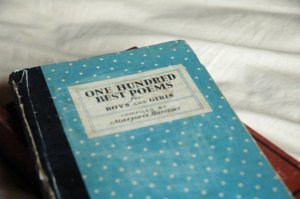 Poetry.
Poetry.
Poetry was those flowery, obscure verses my high school English teacher insisted we read and try to interpret. I remember those days of the teacher asking, “What do you think it means?” I really didn’t know and hoped my guess got close enough to the author’s original intent to earn me an A so I didn’t ruin my grade point average. And who could remember the foreign sounding names of the rhythms of poetry and which syllables were stressed or not? Why did it matter? Who would ever read poetry outside of school besides English majors in college? I sure wouldn’t.
I still don’t read much poetry…. at least, not silently. While working as a private teacher for a family of musicians a couple years ago, I figured I should teach poetry because of its relationship to lyric writing. I bought a program called Linguistic Development through the Memorization of Poetry from the Institute of Excellence in Writing. It sounds complicated, but it’s simple – listen to recordings of poems and speeches and memorize them a few at a time. The program starts with silly, rhyming poems that are easy to memorize and so much fun to recite (“Celery” by Ogden Nash praises cooked celery for being chewed more quietly than the raw version of the vegetable), and incrementally introduces longer poems of more complex structure. I was hooked, and so were my students! It’s a rare ability these days to be able to recite a poem, and students were pleased they could entertain their friends or family in this new way.
What else is there to praise poetry for? Plenty. To loosely quote Andrew Pudewa of IEW, poetry exposes students to “reliably correct and sophisticated English.” Poets choose their words with care and precision. Take one stanza of the poem “Casey at the Bat” and notice all of the sophisticated words Ernest Lawrence Thayer chose to describe the countenance and actions of the proud baseball player:
With a smile of Christian charity great Casey’s visage shone;
He stilled the rising tumult; he bade the game go on;
He signaled to the pitcher, and once more the dun sphere flew;
But Casey still ignored it and the umpire said, “Strike two!”
A child who memorizes this poem may not know the meaning of visage or tumult yet, but he has internalized how those words are used in context with others. How much easier it will be for the child to learn these words when he comes across them in his reading!
Parents, teachers, let’s not neglect the power of poetry to expand our students’ vocabularies! You don’t have to present it in a formal way. Find a good recording of poems to play while children color or build with blocks. Then, give children opportunities to share the poems they have memorized. These rich words will stay with them. Just ask my mother, who memorized “Casey at the Bat” as a child and recited it in its entirety for our family in June at age 64.
